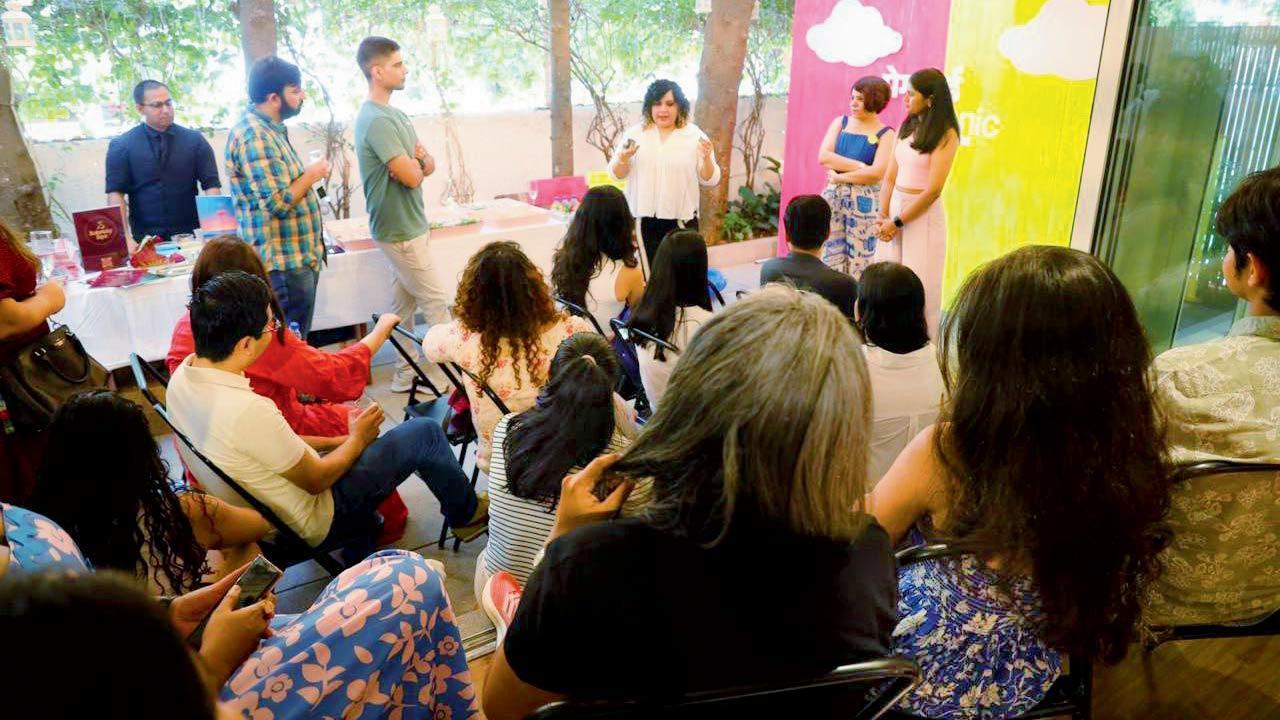They demand ‘work from home’, come in late and quit jobs over work-life balance issues—is Gen Z just difficult to work with, or is it a herald of healthier work culture?

Officials from Pegboard, a culture-bridging workshop based in Mumbai, conduct workshops with organisations to create a more conducive work environment for both junior and senior employees
A few months ago, a Gen Z employee shadowed me for a day to learn the nuances of sports management. To my surprise, the next day, he quit,” recalls Varun Arora, a marketing official with a Singapore-based sports management firm.
ADVERTISEMENT
“The human resources department called to ask if I had said something that may have upset him. But that wasn’t the case. A few days later, I realised it wasn’t about me. The junior employee—who had seemed quite competent, and came from a well-off background—told HR that the work pressure was too much for him to handle.”
Based in Mumbai and working with Gen Z colleagues for the last four years, Arora, 30, says this youngest generation to join the workforce is “entitled”. “They do not have to work for survival, at least not the privileged city slickers who attend English-medium schools. Those from smaller towns and humble backgrounds would still put up with things an average privileged city kid finds unacceptable,” says the executive.
 Esha Nagar, Founder and CEO of Pegboard
Esha Nagar, Founder and CEO of Pegboard
This is not an isolated incident. In May 2024, Resume Genius, an organisation that provides tools and insights for job seekers, reported that 45 per cent of US hiring managers find Gen Z—born between the mid-1990s and early 2010s—to be the most challenging generation to work with. It echoes the concerns that were once raised about Millennials by Boomers.
Robert Subramaniam (name changed), 60, a top-ranking official with a government-owned oil corporation, has worked with employees across several generations in his four-decade-long career. Gen Z, he feels, struggles with workplace adaptability. “If they find a job challenging, they quickly label everything as subpar and move on,” he says, adding, “Communication differences are a key issue with Gen Z. They struggle to write a formal e-mail and often use incorrect language. This is partly because of their reliance on Artificial Intelligence.”
On the other hand, one of Gen Z’s major strengths is an innate familiarity with technology. As per a 2020 report by the World Economic Forum, 93 per cent of this generation uses smartphones regularly—this is at least twice as much as than any other generation, including Millennials. Having grown up with access to the Internet, social media and cell phones, a majority of Gen Z youngsters are proficient in multiple digital platforms.
 Rishika Kashyap, Utkarsh Rai, Harnidh Kaur and Kavya Jose
Rishika Kashyap, Utkarsh Rai, Harnidh Kaur and Kavya Jose
Subramaniam notes how different things were when he started his career in the mid-’80s. “Back then, we would learn only till [we graduated from] college, and it would pretty much stop there. Gen Z, however, is much more curious, especially when it comes to technology and how they use it to learn new things regularly. Their speed and efficiency in using tech is exceptional.”
Fund manager Harnidh Kaur’s entire team comprises Gen Z employees, and she loves working with them. “My team is great to work with, but I think Gen Z are not fans of ambiguity. At work, they need clear instructions and specific targets they need to achieve,” she says, adding, “COVID-19 disrupted a lot of things for this generation, as they began their careers remotely. Being physically present at work feels foreign to them, which might explain why they struggle with traditional workplace structures.”
As more workplaces switch back to a work-from-office system, Gen Z employees vociferously defend their right to continue working from home. Media professional Rishika Kashyap argues, “Why should we spend a fortune on commuting for a meagre starting salary, especially when we can achieve the same quality of work remotely? Structure and discipline can be maintained remotely, too.”
A survey by US educational platform Intelligent in December 2023 found that nearly 40 per cent employers avoid hiring Gen Z, going as far as to offer higher pay and more benefits to attract older workers for the same positions.
But corporations have more to gain if they try to understand how they can help the younger generation be better employees. Gen Z comprises nearly 30 per cent of the global population. Of this group, almost half have already entered the workforce. Their average representation in the global workforce is about 27 per cent, and will continue to rise in coming years.
Esha Nagar, founder of Pegboard—a company which works in the field of culture bridging—gives a broader context for the generational divide, highlighting how it often revolves around differing views on mental health and work-life balance. She notes, “Bridging the generational gap requires communication. Over-communication is sometimes necessary, but the older generation must also let go of their ego to better understand the needs of Gen Z.”
“For this generation, work-life balance is non-negotiable. I know of resignations that have happened over this issue. It’s crucial to bring in policies that support a hybrid work system, as this generation started their careers working from home and continued doing so for over two years,” she stresses.
This opinion is backed by the findings of a 2023 Deloitte Global survey, which highlighted that Gen Z workers often prioritise job satisfaction and personal well-being over job security, leading to higher turnover rates compared to older generations.
Is the constant switching of jobs a marker of an inability to stick it out when the going gets tough?
“I have noticed Gen Z lacks perseverance and has lower tolerance for failures—both of which are crucial for gaining experience… They may have the degrees and the knowledge, but they seem indecisive when it comes to their choice of profession. When our generation had started out, people would stick to one job and did not immediately consider moving. But with Gen Z, from day one, they are not clear about what work they want to do or which company they want to work with,” says Subramaniam.
Kaur, 30, a Millennial, says the way the younger generation perceives the online versus offline world doesn’t differ much, which means their expectations often don’t match the reality of the workplace. “Sometimes, the job requires a certain level of rigour, but Gen Z might feel like it’s a lot of pressure to handle. Their understanding of well-being often comes from Instagram therapists. Any situation that feels uncomfortable is quickly labelled as ‘bad mental health’. But the fact is that it could very well be due to bad work management or poor prioritisation.”
She adds, though, that today’s job-hopping 20-year-olds will eventually have to change their style. “In four to five years, when they reach the mid-management level, they’re going to see a sharp difference in their current working style. You can only learn and be good at your job if you have gone through the troubles of being in a team,” she says.
Ask Gen Z, though, and they’ll tell you the odds are stacked against them. “Our generation has entered a workforce that is not only more talented and educated but also far more competitive than in the past. This heightened competition, along with the rise of generative AI, adds to the pressure and contributes to burnout,” says Utkarsh Rai, 24.
“Moreover, as we joined the workforce, we encountered widespread layoffs and hiring freezes, particularly in white-collar jobs. Employers are increasingly seeking candidates with highly specific skill sets that typically require extensive experience and a distinctive work profile. This situation amplifies our generation’s demand for meaningful work, as our value as workers hinges on the relevance and impact of our roles,” he adds.
Aakanksha Singh, 34, who recruits for auditing firm Ernst and Young, says job satisfaction is a prime factor for this generation. “Up until the Millennials, employees have been satisfied just to earn a good salary. But the younger generation wants meaningful work, which should be seen as a positive trait.”
Among recruiters, the jury is still out on Gen Z. Kavya Jose, 30, a senior professional who formulates HR policies for multiple MNCs, says, “Gen Z is definitely a more difficult generation to work with. They may come in late because they want a workspace that allows for relaxation. Their idea of a conducive work environment is quite different from what older generations might expect. But at the same time, their demands are also somewhat fair. In an era where we prioritise sensitive behaviour and a better quality of life, having a few days of work-from-home and not dealing with toxicity isn’t entirely unreasonable.”
Perhaps it’s time to see Gen Z more as a catalyst for change in the corporate world. Rishika Kashyap says, “Gen Z is more vocal [about mental health] because we are more aware of it. Gen Z refusing to accept toxicity and drawing healthy boundaries should not be seen as being overly sensitive—it’s about setting standards for a healthier workplace.”
Also Read: Does college impart skills for the real world? Gen Z answers
 Subscribe today by clicking the link and stay updated with the latest news!" Click here!
Subscribe today by clicking the link and stay updated with the latest news!" Click here!







